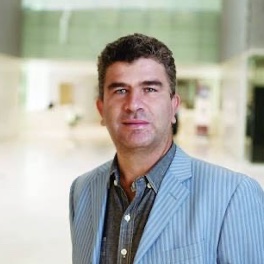

Feb 2025

Host: Professor Imed Gallouzi
Abstract:
Edge intelligence holds immense importance in enabling real-time decision-making and reducing latency by processing data closer to sensing. This approach enhances efficiency, privacy, and security by minimizing the need for constant data transmission to centralized servers. However, the tradeoffs lie in the limited computational power and memory at the edge, potentially restricting the complexity of algorithms and the scale of data processed compared to the vast resources available in the cloud.
This talk presents the fusion of AI with sensors showcasing the integration of AI at an embryonic stage with sensors, leading to a profound impact on sensor functionality and application. The talk will illustrate this transformative integration of AI at the sensor level using three compelling case studies and illustrating the advantages of edge intelligence:
The first case study, within the realm of olfaction, the convergence of bio-inspired classification algorithms with gas/smell sensors presents a breakthrough in realizing an electronic nose. The seamless embedding of AI augments sensor capabilities, enabling training, recognition and classification of diverse odors, mirroring the sophistication of human olfactory system.
The second case study delves into the domain of vision sensors, illustrating how minor modification of pixel structure can accommodate convolutional layers for deep learning. This adaptation amplifies the capacity of vision sensors, empowering them to interpret and process visual data with the sophistication characteristic of deep learning models, enabling efficient integration of deep learning at the sensor level.
Last but not least, the integration of AI with wearable sensors in order to classify signals derived from wearable devices, enabling the discrimination of various gestures, biomechanics, and vital signs of individuals. By embedding AI within these sensors, a new paradigm in healthcare monitoring and patient care unfolds, revolutionizing the real-time analysis and interpretation of physiological data.
In a nutshell, this talk unravels the paradigm shift where AI converges with sensors at the edge, augmenting their capabilities and reshaping possibilities across olfaction, vision, and wearable sensor domains. The talk not only unveils technical advancements in the area but also underscores the transformative potential of extreme edge intelligence in diverse fields.
Bio:
Prof. Amine Bermak received the Masters and PhD degrees, both in electrical and electronic engineering, from Paul Sabatier University, Toulouse, France in 1994 and 1998, respectively. He has held many positions in various continents including full Professor at HKUST Hong Kong, Senior lecturer at Edith Cowan University Australia and a Post-doc at York University, England in a project funded by British Aerospace. He is currently a Distinguished Professor and Associate Dean at the College of Science and Engineering (CSE), Hamad Bin Khalifa University, Qatar.
Prof. Bermak has made fundamental and seminal contributions that range from theory, circuit design techniques, and applications to working systems in the areas of ultra-low power sensory systems, applied to vision, olfaction, temperature sensors, wearable devices and AI systems. He is the recipient of 6 best papers awards and the winner of the 2011 Michael G. Gale Medal for distinguished teaching at HKUST and the “Engineering School Teaching Excellence Award". He is the recipient of the best researcher award at CSE in 2019 and best innovator award at HBKU in 2022; the service excellence award at HBKU in 2023 and research excellence award at HBKU in 2024. Prof. Bermak has 13 patents and over 500 articles in journals, book chapters and conference proceedings. He has supervised and graduated 38 PhD and 34 MSc students and designed with his students over 50 VLSI chips. He has been very actively involved in many research and industrial projects in collaboration with Motorola-France, TI, Intel, 3D plus- France, British Aerospace-UK, Intelligent Pixel Inc. – USA, ASTRI- Hong Kong; with a research grant portfolio of over 20M USD. He has served on the editorial board of IEEE Transactions on Very Large-Scale Integration (VLSI) Systems and IEEE Transactions on Circuits and Systems II, IEEE Transactions on Biomedical Circuits and Systems; IEEE Transactions on Electron Devices and Nature Scientific Reports. He was the general chair of numerous international conferences such as IEEE BioCAS 2009; IEEE Delta 2010 and IEEE ICM 2024. Prof. Bermak was the co-director of MIT-HKUST Consortium. He is an IEEE distinguished Lecturer, a Fellow of AAIA and a Fellow of IEEE. He is also the chair of HBKU University Senate.